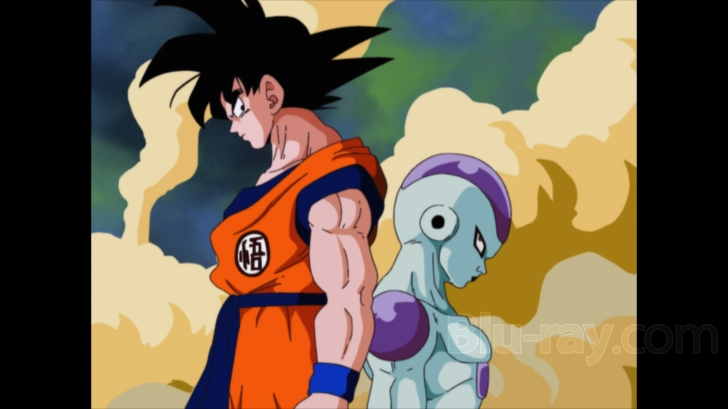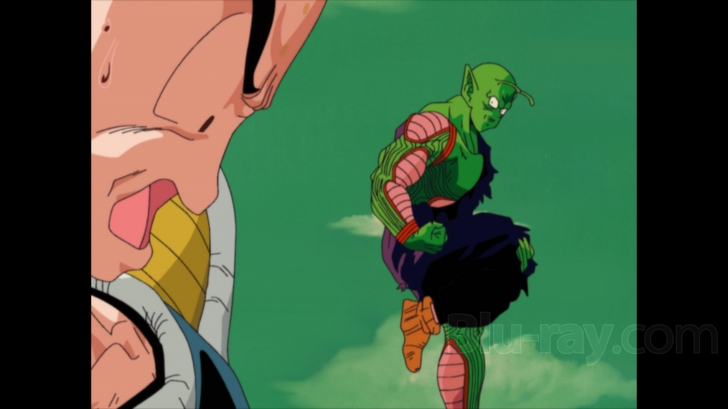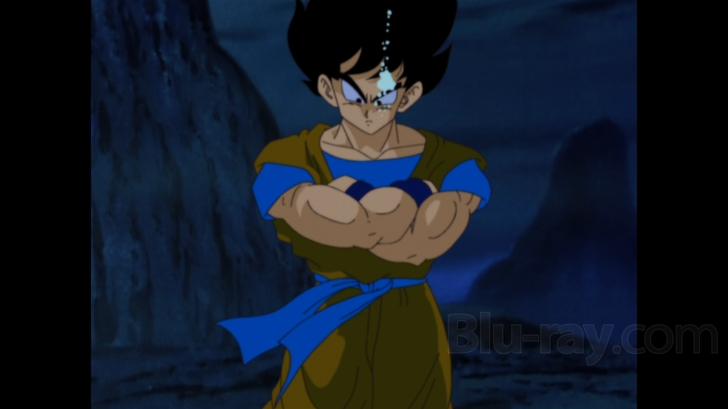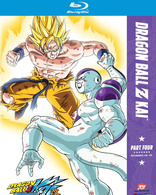Dragon Ball Z Kai: Part 4 Blu-ray Movie
HomeDragon Ball Z Kai: Part 4 Blu-ray Movie 
FUNimation Entertainment | 2010 | 325 min | Rated TV-PG | Mar 08, 2011Movie rating
8.1 | / 10 |
Blu-ray rating
| Users | 4.2 | |
| Reviewer | 2.5 | |
| Overall | 2.9 |
Overview
Dragon Ball Z Kai: Part 4 (2010)
After learning that Frieza murdered his father and destroyed his home planet, Goku takes aim at the putrid purple monster in the greatest grudge match the galaxy has ever seen! The bruises multiply at a furious rate as the two warriors trade blows in a battle that literally destroys planet Namek. As the slugfest approaches a standstill, Frieza forever silences Goku's closest friend sending Earth s hero into a Super Saiyan rage that threatens to obliterate them both!
Starring: Masako Nozawa, Ryō Horikawa, Toshio Furukawa, Mayumi Tanaka, Hiromi TsuruNarrator: JŰji Yanami, Doc Morgan
Director: Yasuhiro Nowatari, Togo Shoji, Osamu Kasai, Daisuke Nishio, Kazuhisa Takenouchi
| Anime | Uncertain |
| Foreign | Uncertain |
| Action | Uncertain |
| Fantasy | Uncertain |
| Sci-Fi | Uncertain |
| Comic book | Uncertain |
| Adventure | Uncertain |
| Martial arts | Uncertain |
Specifications
Video
Video codec: MPEG-4 AVC
Video resolution: 1080p
Aspect ratio: 1.33:1
Original aspect ratio: 1.78:1, 1.33:1
Audio
English: Dolby TrueHD 5.1 (48kHz, 16-bit)
Japanese: Dolby TrueHD 2.0
Subtitles
English
Discs
50GB Blu-ray Disc
Two-disc set (2 BDs)
Packaging
Slipcover in original pressing
Playback
Region A, B (locked)
Review
Rating summary
| Movie | 2.5 | |
| Video | 3.0 | |
| Audio | 2.5 | |
| Extras | 0.5 | |
| Overall | 2.5 |
Dragon Ball Z Kai: Part 4 Blu-ray Movie Review
Redundant yet epic is the best way to describe the fourth volume in the series.
Reviewed by Dustin Somner March 30, 2011Despite the prominence of the Dragon Ball franchise among Japanese anime enthusiasts since its inception in 1984, the series received little exposure on western shores during the 80ís and early 90ís. Thankfully, as the new millennium approached, television entertainment aimed at younger viewers began to undergo a profound transition thanks to the Pokemon craze, leaving the door wide open for the proliferation of anime entertainment in the Saturday morning cartoon block. Plenty of card-trading clones emerged to anxiously gobble up a piece of the pie, but other production studios recognized the potential for success in anime series that fit a different mold. With this in mind, the aging Dragon Ball franchise was introduced to Americaís youth, offering a violent-but-campy storyline, and all manner of outlandish characters. Unfortunately, the first series never gained much traction with the younger viewing audience and was soon replaced by the action-heavy Dragon Ball Z incarnation. When the second series met the same fate during its trial run, FUNimation made the wise decision to rethink the target market of the series, and re-release it during the adult-oriented Toonami slot on Cartoon Network. As a result of that move, Dragon Ball Z became a breakaway success on television and home video, earning its designation at the top of the most recognizable anime series in history.

The showdown...
Dragon Ball Z Kai (Kai translates to ďrevisedĒ) is a project undertaken by Toei Animation Studio to celebrate the 20th Anniversary of the showís initial broadcast. It offers a condensed 100-episode version of the original 291-episode story arch, with any resulting plot-holes addressed in brief narrative segments. Aside from the shortened runtime, the new series also includes remastered high-definition video and sound, with a completely new recording by the original voice cast. Unlike other remasters before it, this is not merely a clean-up project to remove dirt and grime - itís also a complete reevaluation of source elements with entire segments discarded and replaced (if deemed overly-compromised for high-definition viewing).
When we last visited our cast of heroes, Frieza was undergoing a sequential transformation into an unstoppable tyrant, while Gohan, Krillin and Vegeta did their best to formulate a plan of attack. Matters seemed to improve with the resurrection of Piccolo from King Kaiís realm, but despite his fusion with Nail, his powers registered far below Friezaís. With the future of Planet Namek hanging in the balance, the only remaining hope falls on the shoulders of a newly rejuvenated Goku, who arrives just in time to witness Vegetaís demise. As Vegeta lay dying, he informs Goku of Friezaís history with their Saiyan homeworld, begging him to avenge their fallen race. Filled with newfound resolve, Goku squares off with Frieza in the battle to end all battles.
If youíre familiar with the structure of the original Dragon Ball Z series, this box set begins around episode 83, and ends with the events of episode 104. Considering the fourth volume of Kai finishes with episode 52 of the re-imagined series, weíre on track for a total episode count that slices the original series in half. As Iíve mentioned before, this results in significant gains in the areas of plot development and pacing, allowing the Dragon Ball Z series to become much more accessible to a wide audience.
Interestingly enough, this volume marks the first time Iíve felt a bit underwhelmed by the pacing of the 13-episode block. Itís been a number of years since I watched the Dragon Ball Z series, but I recall thoroughly enjoying the Frieza plotline through the original incarnation. Despite the consolidated story in this 13-episode arch, too much time is spent on the single battle between Goku and Frieza, which never departs from the surface of Planet Namek. Despite my fond memories of the villain Frieza, Iíve grown accustomed to the quick pacing of the prior three volumes, which dispensed with the drawn out fight sequences and introduced new characters or locations in rapid succession. As you can imagine, it was difficult to move into a more traditional DBZ structure after adjusting to the new style of the revamped series.
Despite my reservations with Volume Four, the one element that can be found in healthy doses is the epic nature of the standoff between Goku and Frieza. Between powerful transformations, new attacks, and the intervention of creatures all over the galaxy, we end up with one of the more memorable experiences within the DBZ universe. This single factor partially made up for the lack of variety in characters and locations, but couldnít possibly cover enough ground to match the originality of the previous volumes.
Dragon Ball Z Kai: Part 4 Blu-ray Movie, Video Quality 

Presented in 1080p utilizing the AVC codec (at an average bitrate of 26Mbps), Dragon Ball Z Kai looks as good as I anticipated in the transition to Blu-ray. As mentioned earlier in the review, this isn't simply a remastered version of the series (as offered on prior DVD editions), it's a full-blown frame by frame digital clean-up, with newly created animation replacing entire segments. Identifying these new scenes is easy given the subtle stylistic differences (mainly in shadowing and the consistency of lines), but they blend well enough to avoid causing any major distractions. Aside from the new animation, the major difference in this newly-minted version is a complete lack of print flaws found in the original elements. Gone are the large burn-marks, dust blobs, and nicks that we've grown accustomed to finding throughout most episodes. In their place, we're given a clean image that accurately reflects the core intentions of the simplistic animation, but doesn't artificially enhance aspects of the hand-drawn style. You'll still notice byproducts of limitations in the source material, such as line breaks, slight image shift (from one frame to another), and a marginal level of detail, but considering the age and budget of the series, this is likely the best it will ever look.
Dragon Ball Z Kai: Part 4 Blu-ray Movie, Audio Quality 

To accompany the upgraded visuals, the Japanese and English audio tracks have been reworked from the ground up to include newly recorded dialog from the original voice-actors. The Japanese version offered on the disc is a lossless 2.0 mix, which presents a clean, full sound despite the lack of true surround separation. On the English side, we've been treated to a lossless 5.1 mix, which quickly earned its designation as my track of choice. I typically prefer the Japanese language track on most anime series, but given my extensive introduction to the dubbed version of Dragon Ball Z on Cartoon Network, I associate the voice-work of the English cast with the nuances of each character in the show. Switching back and forth between the two tracks, it's clear the English offering incorporates a greater sense of immersion, separating sound effects across the surround spectrum to accompany the onscreen action. However, the differences in volume balance, clarity, and overall richness are negligible, allowing fans of either track ample reason to rejoice.
Dragon Ball Z Kai: Part 4 Blu-ray Movie, Special Features and Extras 

Mirroring the first two volumes, the only extras included on the discs are textless opening/closing theme music and a collection of previews for other FUNimation releases. I thought we'd continue to at least receive cast interviews after the third volume, but it looks like that will only be an occasional addition.
Dragon Ball Z Kai: Part 4 Blu-ray Movie, Overall Score and Recommendation 

If you're a Dragon Ball Z fan and you own the prior three box sets of the Kai series, you shouldn't need my recommendation on whether or not you'll continue to stick with it going forward. I walked away from this volume with my own set of reservations about the 13 episodes presented within (longing for less fighting and more plot development), but how can we argue against a structure that's been in place since the inception of the show. From a purely topical analysis, Dragon Ball Z will always have its fair share of weaknesses due to the redundant nature of the programming, but the restructuring on Kai continues to be a major step in the right direction, delivering a final product that will surely stand the test of time.
Other editions
Dragon Ball Z Kai: Other Seasons

Dragon Ball Z Kai: Part 1
2009

Dragon Ball Z Kai: Part 2
2009

Dragon Ball Z Kai: Part 3
2009-2010

Dragon Ball Z Kai: Part 5
2010

Dragon Ball Z Kai: Part 6
2010

Dragon Ball Z Kai: Part 7
2010-2011

Dragon Ball Z Kai: Part 8
2011

Dragon Ball Z Kai - The Final Chapters: Part 1
2014

Dragon Ball Z Kai - The Final Chapters: Part 2
2014-2015

Dragon Ball Z Kai - The Final Chapters: Part 3
2015
Similar titles
Similar titles you might also like

Dragon Ball Z: Bardock - The Father of Goku
1990

Dragon Ball Z: Resurrection 'F'
2015

Dragon Ball Z: The History of Trunks
1993

Dragon Ball Z The Movie 8: Broly - The Legendary Super Saiyan
1993

Dragon Ball Z The Movie 3: The Tree of Might
1990

Dragon Ball Z: Battle of Gods
Extended Edition
2013

Dragon Ball Z The Movie 13: Wrath of the Dragon
1995

Dragon Ball Z The Movie 7: Super Android 13
1992

Dragon Ball GT
1996-1997

Dragon Ball Z: Seasons 1-9 Collection
1989-1996

Dragon Ball Z The Movie 9: Bojack Unbound
1993

Dragon Ball Super: Complete Series
Limited Edition
2015-2018

Dragon Ball Z The Movie 10: Broly - Second Coming
1994

Fullmetal Alchemist Brotherhood: Box Set 2
鋼の錬金術師 FULLMETAL ALCHEMIST
2009-2010

Dragon Ball Z The Movie 11: Bio-Broly
1994

Dragon Ball Z The Movie 2: The World's Strongest
1990

Dragon Ball Z The Movie 5: Cooler's Revenge
1991

Dragon Ball Z The Movie 6: The Return of Cooler
1992

Dragon Ball Z The Movie 4: Lord Slug
1991

Dragon Ball Z The Movie 12: Fusion Reborn
1995
